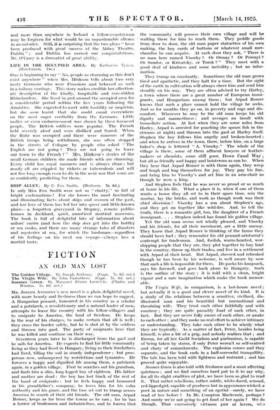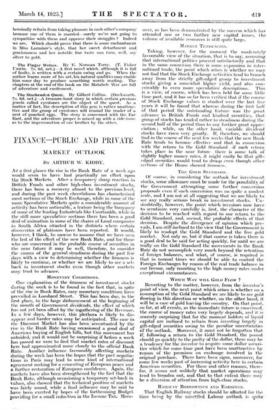FICTION
AN OLD -MAN LOST MR. JOSEPH ANTHONY'S new novel is a plain, delightful novel, with more beauty and freshness than we can hope to suggest. A Hungarian peasant, honoured in his country as a scholar and a patriarch, a revolutionary and a natural leader of men, attempts to leave the country with his fellow-villagers and to emigrate to America, the land of freedom. He keeps in the rear of his charges, to make certain. that all is well ; they cross the border safely, but fic_is shot at by the soldiers and thrown into gaol. The party of emigrants hear that . he was killed and continue on their' way.
Seventeen years later lie is discharged -from the gaol and he sails for America. - He expects to find his-little community living as theyhadlived-in-Hungary,-living as their forefathers . had lived, tilling the soil in sturdy. independence ;- but pros- perous now, unhampered by .restrictions and tyrannies. He foresees a happy and dignified life among them, a patriarch again; in a golden village. First Ile searches out his grandson, and finds him a slim, long-legged boy of eighteen. His father and mother are dead : the boy has lost track of the rest of the band of emigrants : but he feels happy and honoured in his grandfather's company, he loves him for his calm authority and his grace, and the two set out to tramp across America in search of their old friends. The old man, Arpad • Ramer, keeps as far from the towns as he can ; for he has a horrar of tradesmen and industrialism, and he knows that the community will possess their own village and will be waiting there -for -him to reach- them. They peddle goods
from door to door, the old man paper statuettes of his own making, the boy cards of buttons or whatever small mer- chandise he can acquire. At each door they ask, " There is no man here named Visocky ? Or Ormay ? Or Perenyi ? Or Sandor, or Krivatsky. or Torok ? " They meet with a good deal of kindness and some incivility ; but no infor- mation.
They tramp on constantly. Sometimes the old man grows tired and apathetic, and they halt for a time. But the sight of the earth in cultivation will always cheer him and send him steadily on his way. They are often advised to try Harley, a town where there are a great number of European immi- grants, and Hungarians among them ; but Arpad Romer knows that such a place cannot hold the village he seeks. And so for months they go on, in poverty and rags and dis- comfort. Wherever he may be the old man keeps his old dignity and mannerliness ; and avenges an insult with immediate action. At last when they are some miles from Harley, Arpad is arrested for poaching (he spears fish in the streams at night) and thrown into the gaol at Harley itself. Stephen the boy follows him angrily and broken-hearted ; and when he arrives in the town, there, before him, on a large baker's shop is lettered " A. Visocky." The whole of the village is there, some of them affluent lawyers or leather- makers or chemists, some still poor, Down Canal Way ; but all as friendly and happy and boisterous as can be. When they hear that Arpad Romer is with them again, they weep and laugh and hug themselves for joy. They pay his fine, and bring him to Visocky's and set him in an arm-chair as though he were a king.
And Stephen feels that he was never so proud or so much at home in his life. What a place it is, when if one of them wants a house they all set to in their spare time, mix the mortar; lay the bricks, and work as though work was their chief diversion ! Visocky has a son about Stephen's age, and they get on together like wild-fire. And; to tell the truth, there is a romantic girl, too, the daughter of a French immigrant. . . . Stephen indeed has found his golden village.
Yet the old man seems not wholly pleased, and Visocky and his friends, for all their merriment, are a little uneasy. They know that Arpad Romer is thinking of the farms they should have had ; they remember his old peasant-aristocrat's contempt for tradesmen. And, foolish, warm-hearted, wor- shipping people that they are, they plot together to buy land in the country, throw up their trades, and live in a settlement with Arpad at their head. But Arpad, cheered and refreshed though he has been by his welcome, is well aware by now that such a life is impossible for them. He packs his knapsack, says his farewell, and goes back alone to Hungary. Such is the outline of the story ; it is told with a clean, bright vigour and a sure imagination which make the book memor- able.
The Virgin Wife, in comparison, is a hot-house novel ; but actually it is a good and clever novel of its kind. It is a study of: the relations between a sensitive,- civilized, dis- illusioned man and his beautiful but unemotional and theorizing wife.- They treat each other faithfully and with courtesy ; they are quite passably fond of each other, in fact. But they are never fully aware of each other, or awake to each other ; and they make no real effort to achieve intimacy or imderstanding. They take each other to - be wholly :cv.hat they are typically. As a matter of fact, Peter, besides being himself; is also a bit of a. prig; and-nobody realizesthat ; and Emma, for all her Guild Socialism and puritanism; is capable of being taken by storm, if only Peter weren't so self-centred and -chary- of- cemmitments:: The explosion comes and they separate; and the book ends in a -half-sorrowful tranquillity. The tale has .been told with lightness and restraint ; and has
proved- quite enjoyable. •
Soames Green is also told with freshness and a most affecting quietness ; and we find ourselves hard .ptit to it to say why, for all its slight crudities of plot, we have been so glad to read it: That rather rebellious, rather subtle, white-faced, sensual, red-lipped girl, capable of goodness but in appearance wicked, a poet in nature and something of an egotist—surely, we have read of her- before ? In -Mr. Compton Mackenzie, perhaps ? And surely we're-not going to get fond of her again ? We do though. That excessively virtuous pair of lovers.' heroically refrain from taking pleasure in each other's company because one of them is married—surely we're not going to sympathize with them and approve their struggles ? Indeed we are. Which should prove that there is some enchantment in Miss Larminie's style, that her sweet detachment and graciousness and her notable fine taste can turn, well, say silver to gold.















































 Previous page
Previous page